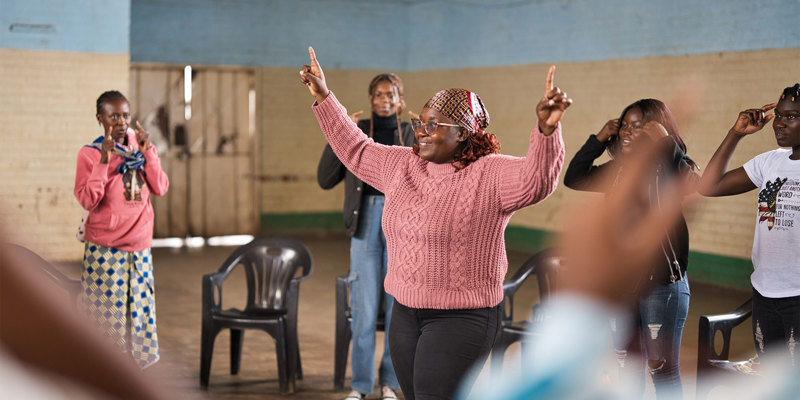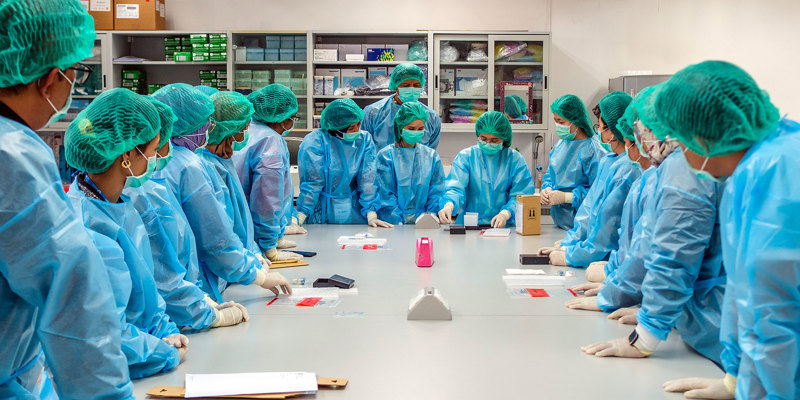Rwanda and Global Fund Launch New Grants to Expand Progress Against AIDS, TB and Malaria and Strengthen Health Systems
03 July 2024
KIGALI – The Global Fund to Fight AIDS, Tuberculosis and Malaria (the Global Fund) and the government of the Republic of Rwanda launched the implementation of two grants this week, worth a total US$174 million. The funding will help sustain and expand Rwanda’s progress against AIDS, tuberculosis (TB) and malaria, and strengthen health and community systems across the country over the 2024-2027 grant period.
As in the previous grant cycle, the Ministry of Health of Rwanda will implement the grants under Rwanda’s National Strategy Financing model – “Payment for Results” – which is fully owned and driven by in-country policies, strategies, processes and institutions. Civil society partners and communities most affected by the three diseases will support implementation.
A major focus of the new grants is malaria prevention. In the face of increasing resistance to insecticide, Rwanda and health partners will deploy a strong integrated vector management approach with a gradual transition from indoor residual spraying to the introduction of next-generation mosquito nets in selected districts. Malaria surveillance will be intensified with therapeutic efficacy studies, entomological monitoring to better understand vector behaviors and enhancements at community level to better target interventions.
For HIV and AIDS, the grants will help expand HIV prevention packages, including long-acting injectable pre-exposure prophylaxis (PrEP). The grants will also support efforts to prevent mother-to-child transmission, increase integration of services, including with non-communicable diseases and mental health, and reduce human rights-related barriers to HIV and TB services.
For TB, the ambition is to intensify active case finding among key populations and scale up prevention and treatment interventions, including by using new technologies such as AI-powered portable digital X-rays.
The new grants also include funding to strengthen systems for health in areas such as human resources and community systems, disease surveillance, laboratories and diagnostics, medical gas facilities, health product and waste management, and health system digitization. For example, the grants include US$2 million from the Digital Health Impact Accelerator (DHIA) funds to support the development of an online health portal that facilitates a seamless connection of medical records, allowing patients to become active partners and full owners of their medical data. These investments will work in complement with the US$99 million in funds from the COVID-19 Response Mechanism that have supported the country’s response to COVID-19, health systems strengthening and pandemic preparedness since 2020.
The total funding mobilized through the Global Fund is complementary to Rwanda’s US$283.5 million co-financing commitment from 2025 to 2027.
Rwanda and the Global Fund have been partners since 2003, with cumulative investments of US$1.79 billion to date in the fight against AIDS, TB, malaria and COVID-19, and in health systems strengthening.
In addition, the Global Fund has worked with Rwanda’s Ministry of Health and private sector partners Mastercard and Microsoft to develop data and interoperability standards as the foundational layer of implementing the ministry’s digital health strategy. The Global Fund also supports the Kigali-based HealthTech Hub Africa, which brings together African digital health innovators, ministries of health, and financing organizations to refine, test, fund and scale solutions to meet needs across a spectrum of global health challenges.
Over the last decade, Rwanda has made significant progress in curbing HIV, TB and malaria, as well as building a strong health infrastructure and developing fully integrated primary health care services. One key to Rwanda’s success is the community health management model, which has dispatched trained community health workers in villages across the country, supporting integrated services to reach the last mile.
A donor to the Global Fund, Rwanda pledged US$3.25 million at the Global Fund’s Seventh Replenishment in 2022, a 30% increase compared to the Sixth Replenishment.







